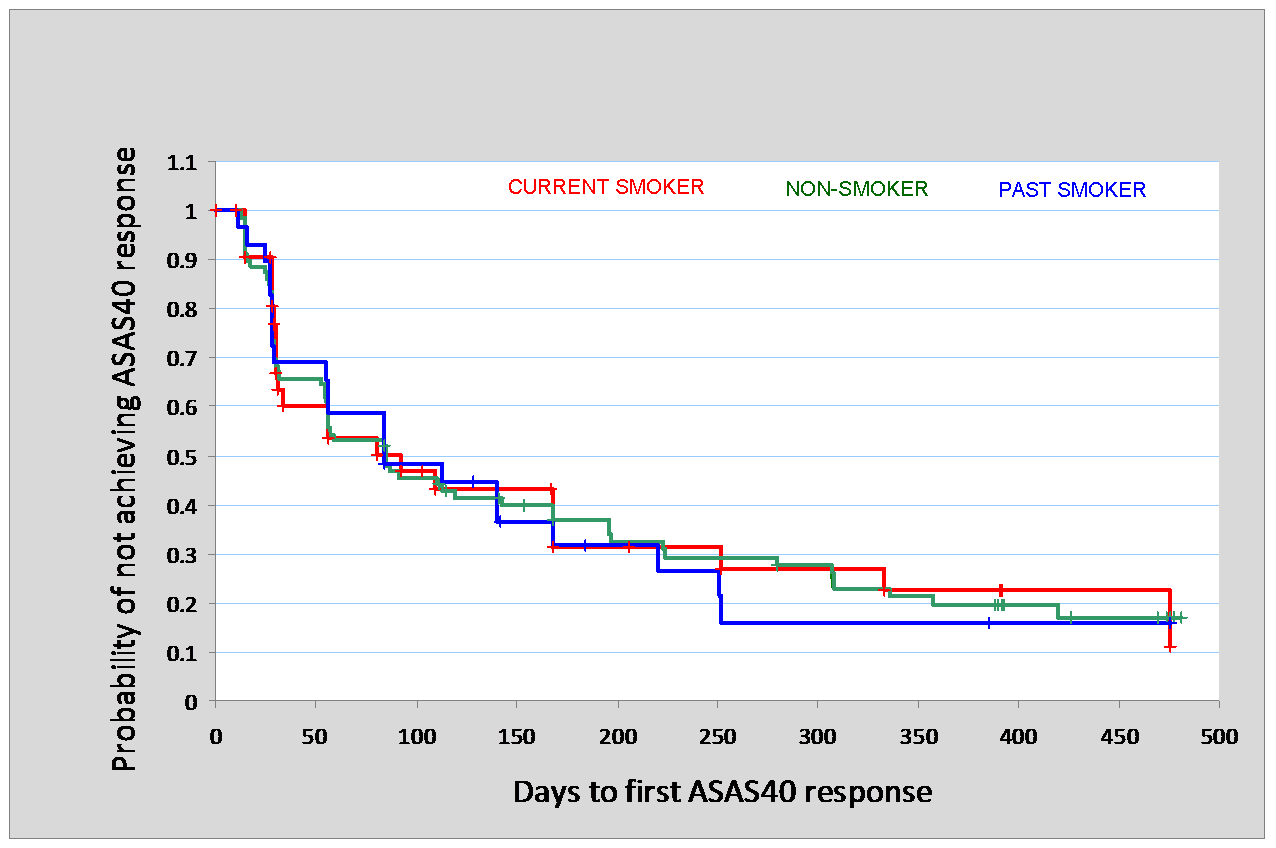Session Information
Session Type: Abstract Submissions (ACR)
Background/Purpose:
Cigarette smoking has been reported as a risk factor for early disease onset, higher disease activity, and poor function in patients (pts) with axial spondyloarthritis (SpA). Adalimumab (ADA), approved for treating ankylosing spondylitis (AS), was recently approved in the EU for the treatment of adults with severe axial spondyloarthritis without radiographic evidence of AS, but with objective signs of inflammation by elevated CRP and/or MRI who have had an inadequate response to, or are intolerant to non-steroidal anti-inflammatory drugs. The objective of this analysis was to examine the association of smoking with baseline pt characteristics, disease activity, and clinical outcome after treatment with adalimumab in pts with non-radiographic axial SpA (nr-axSpA).
Methods:
ABILITY-1 is an ongoing phase 3, double blind (DB), randomized, controlled trial in pts with nr-axSpA fulfilling ASAS classification criteria for axial SpA but not modified New York criteria for AS who had an inadequate response, intolerance, or contraindication to NSAIDs. A 12-wk DB period of ADA 40 mg every other week (eow) or placebo was followed by an open-label (OL) extension phase in which pts could receive OL ADA 40 mg eow for up to an additional 144 wks. This post hoc analysis of data through wk 68 evaluated the differences in baseline characteristics and disease activity and response to treatment in current smokers vs. past smokers vs. nonsmokers in a subpopulation with positive MRI or elevated CRP (MRI+/CRP+) using a chi-square test or one-way analysis of variance (depending on categorical/continuous variables). Kaplan–Meier analysis was performed for time to first ASAS40 response using smoking status as strata.
Results:
142 pts were in the MRI+/CRP+ subpopulation; 63 (44%) were smokers [34 (24%) current smokers, 29 (20%) past smokers] and 79 (56%) were nonsmokers. Few differences were observed between current smokers, past smokers and nonsmokers at baseline (BL) and no differences were observed in age at SpA symptom onset or diagnosis. At BL more nonsmokers 43/79 (54%) than smokers [past smokers 13/29 (45%), current smokers 10/34 (29%)] had elevated CRP levels. Smoking status did not predict response to ADA therapy with no differences observed in ASAS20, ASAS40, ASAS PR, ASAS5/6, BASDADI50, ASDAS, BASFI, BASMIlin, PGA, PtGA, HAQ-S or SF-36 PCS responses at wks 12 and 68. There was also no difference in the percentage of patients who had SPARCC scores of the SI joint or spine ≥2 at weeks 12 and 52 based on smoking status. Additionally, the time to reach ASAS40 response was not different between past smokers, current smokers and nonsmokers (figure).
Figure.
Conclusion:
Disclosure:
J. Sieper,
AbbVie, Merck, Pfizer, UCB,
2,
AbbVie, Merck, Pfizer, UCB,
5,
AbbVie, Merck, Pfizer, UCB,
8;
D. Poddubnyy,
MSD,
5,
AbbVie, MSD, Pfizer, and USB,
8;
A. L. Pangan,
AbbVie,
1,
AbbVie,
3;
S. S. Rathmann,
AbbVie,
1,
AbbVie,
3;
J. K. Anderson,
AbbVie,
1,
AbbVie,
3.
« Back to 2013 ACR/ARHP Annual Meeting
ACR Meeting Abstracts - https://acrabstracts.org/abstract/smoking-was-not-associated-with-response-to-adalimumab-therapy-in-patients-with-non-radiographic-axial-spondyloarthritis/

